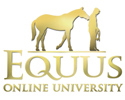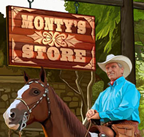I would love to see some lessons on weaning foals.
In "From my Hands to Yours" there's a very good chapter on the subject, but there are so many aspects to it.
Miriam
← back
University Suggestion Box
weaning

Rewards
Subscribe to Equus Online University and become a part of Monty's worldwide mission to leave the world a better place for horses and for people too.
Students automatically gain access to special rewards, such as exclusive discounts at the Monty Roberts Online Shop. Visit Monty Roberts Online Shop.



Does this mean that your baby is ready to be weaned, Miriam?
Hi Maggie,
I don't own a foal, but work at a breeder for Arabians, that has one, two or more foals every year. I've been with them now for three years and seen quite some good weaning. They keep their herd together, in the field as well as in the stables, the youngsters always get an education from the mares. Only at weaningtime they keep a small group apart from the rest, so the foal has some very familiar youngsters around it all the time. As soon as milkproduction has stopped and the foal is at ease with it's mates, they all return to the herd. It's amazing to see how dams and foals seek eachother, no fuzz about drinking or kicking the foal away.
The adult stallion and the young stallions stand next to the mares and foals in the stables all year round, so teasing is not an issue, and they're all used to eachothers presence and hormones. Sure they have to be kept safe, so physical contact, but in my opinion this is a very good way to handle a herd. Foals show respect to the older horses and have their mates to play with.
This much to your question, keep the good work up!
Miriam
I meant " so no physical contact"!
Momma apologies for that. This does sound like an excellent way to handle them. Always felt sorry for Tricka when she was a baby as she had no play mates.
iPads! Mmmm. Not Momma!
Hi all,
I've just across some very good video's on Anna Twinney's website "Reach Out To Horses" on the subject of training foals and weanlings. As always it turns out, that most training is for the humans, horses know their own language. I'm in awe of how little it takes to gain trust and help these youngsters with their first steps as a companion to us humans, if done properly! Just learn to listen and to react in the right way. Now that's easier said than done, but there's so much to learn! Of course this is not "weaning" in the direct sense of the word, but I thought some of you might be interested. Even if not in foals, it's so cool to learn from untouched horses anyway. What they express is so clear, it's not intervened with by training or habits.
Have fun!
Miriam
Maggie - I did blink when I saw Momma...hahaha
Thanks for the info Miriam, always good to come across new people
Hi Vicci,
Anna Twinney is a Monty Roberts Instructor, she used to work at Flag Is Up Farms in the 90's.
She then choose another path, Reiki, holistic, telepathy etc, but her approach is very fine and
still very "Monty". I love her video's on feral foals, such an ocean of learning and Anna has the gift of being able to put in words what the horse expresses through bodylanguage.
Enjoy!
Miriam
I breed thoroughbreds and most of the conventional weaning I have seen involves massive distress to both mare and foal and breaks your heart to watch and hear them scream for each other. I leave my mares and foals together till the mummy makes it very clear that foal is big enough to look after itself and till the foal has confidence to be without her, then I begin to separate them by a fence, they can still touch and groom over the fence. It's amazing how quickly the foals gain the confidence to wander off with their mates knowing their mummy is just over the fence. When they are completely weaned and used to living apart I will put them back in together and they are fine. It breaks my heart seeing conventional weaning, it must do such damage to a foal's confidence. At no time are my foals or mares ever distressed and I don't see why anyone would want to cause such trauma to their horses.
Hi allsafb,
Your method of weaning sounds very good! You are so right to try to make this step as soft as possible, why traumatise a young, any, animal?! If one reads about conventional methods, most foals are prone to infections after weaning due to high stress levels.
Do you imprint your foals at birth? Just curious...
Keep the good work going!
Miriam
Hi allsafb
I am using the same method as you. My first mare and I bought her not knowing she was pregnant so was quite an experience. My foal (colt) now 10 months and I started weaning just over a week ago. Firstly couple of weeks ago separated them in the day then 1st May did the big separation. My mare and foal are normally stabled at night but i found they get very bored now in the stable so we now have created a paddock where they can walk out of their stable and still see each other, next to each other. Problem is now they dont want to go in at all! Now that they have tasted the freedom. Many people in my country believe your horse should live out but I worry about injuries etc. But they are happy so am leaving them out for now. Another problem, my colt had a friend for a few months but unfortunately he had to go home a few days ago so i am worried this will affect him. He is with an elder mare and gelding which i swop around between him and his mom but not the same, he used to love running and playing with his friend and now that has stopped. He is taking everything rather well but seems to be getting a bit aggressive at feed time and treats time but hoping this is just a passing phase as I know he is confused.
Hi lucile, lovely to hear your gentle way of separating them. Couple of things in response to your concerns/questions (1) If they are happy out and have the option to go in and out as they choose this is the best way - they are fine don't worry :-) (2) The biting and "aggression" is a normal part of his development as his testosterone kicks in HOWEVER he needs the boundaries setting right away about what is acceptable. What is going on at feed time and "treat" time? Are you treating him from the hand? If so what with (and why?) - some more info about this would be useful. (3) He is not too young to go onto a Dually and start learning some early ground manners - tiny sessions to start with, he's still a baby (4) The loss of his friend is not a big deal if he is not worried about it - you are doing great in rotating as its important he doesn't overbond with a particular horse. (5) Are you having him castrated? Hope that helps as a starter, keep us posted :-)
Hi Lucile,
Adding to what Vicci writes above and I agree with totally, my question is if you could possibly find another (or more) weanlings as companion for your colt. Playing is so important for their development, psycological and physical, lung-volume and strength of joints and tendons. He seems to adapt to not having a mate to play with, but it's not optimal for a colt to grow up without one. You could have them stay with the elder horses, so they receive some education and boundaries, just like you do now. It could even bring in some money, if you have somebody else's weanling for the time they need to grow and play.
Miriam
Good point Miriam, you're right, while he is coping, the ideal would be to have another youngster around too.